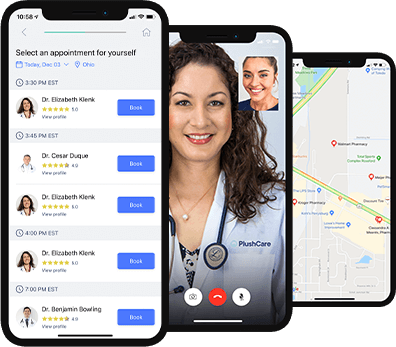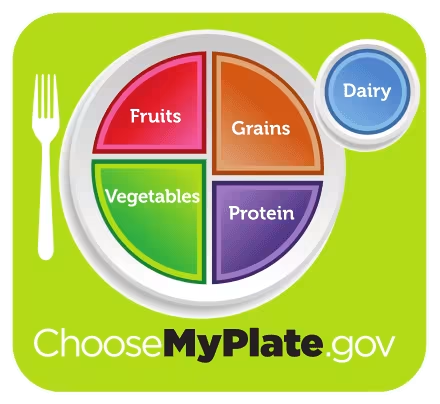National Nutrition Month
March of every year is National Nutrition Month. It’s an annual campaign created by the Academy of Nutrition and Dietetics to spread awareness about how important it is to make informed food choices and develop good eating and physical activity habits. Poor eating habits can contribute to obesity, which can cause life-threatening health problems.

1
Book on our free mobile app or website.
Our doctors operate in all 50 states and same day appointments are available every 15 minutes.
2
See a doctor, get treatment and a prescription at your local pharmacy.
3
Use your health insurance just like you normally would to see your doctor.
“Fuel for the Future”
The 2023 theme for National Nutrition Month is “Fuel for the Future.”
Some tips to help improve your nutrition include:
Practice portion control
Hydrate healthfully
Include healthy choices from each food group every day
Spend time enjoying your food
Learn how to read and understand the Nutrition Facts Panel
Use a grocery list when shopping
Plan healthful eating while traveling
Be menu-savvy when eating out
Keep healthful ingredients on hand
Try new foods and flavors
Practice good food safety
Seek personalized nutrition information
The Old Food Pyramid is Now ChooseMyPlate
From 1992 until 2011, the United States government used the food pyramid model to educate Americans on how to eat healthy. The idea behind the pyramid was that the healthiest foods, which we should eat the most of, were on the bottom of the pyramid, while foods we should eat less of were at the top.
There were a lot of problems with the food pyramid model, however, so the United States Department of Agriculture (USDA) introduced ChooseMyPlate in 2011.
Now, the 5 main food groups are displayed on a plate and glass rather than a pyramid. Dairy, considered as optional by some, is represented by the glass, while vegetables, grains, fruits, and protein are split up on the plate in varying portions.

Here are some tips from the new MyPlate:
Make half your plate fruits and vegetables
Half your grain intake should be whole-grain foods
Limit saturated fat, sodium, and added sugar
Vary your protein sources to include things like seafood, beans, eggs, unsalted nuts, poultry, and lean meat
Switch to 1% or skim milk and other dairy products
Get more physical activity
Problems Associated with Obesity
Why is nutrition so important? Poor nutrition contributes to obesity, which can cause complications like:
Stroke or heart disease caused by high blood pressure and abnormal cholesterol levels.
Type 2 diabetes, because obesity can affect how your body uses insulin to control blood sugar levels.
Digestive problems like gallbladder disease, heartburn, and liver problems.
Certain cancers are linked to obesity, especially those affecting the uterus, endometrium, ovary, cervix, breast, rectum, colon, esophagus, liver, pancreas, gallbladder, kidney and prostate.
Sleep apnea, a potentially serious condition where a person stops breathing when they sleep.
Osteoarthritis, which can be caused by increased strain on the joints resulting from increased weight and chronic inflammation.
Gynecological and sexual problems such as infertility, irregular periods, or sexual dysfunction.
What Is Obesity?
More than one in three American adults (39.8%) have obesity.
According to the Centers for Disease Control and Prevention (CDC), obesity is defined as a BMI (body mass index) of 30 or higher.
To find your BMI, divide your weight in pounds by your height in inches squared and multiply by 703. A healthy BMI is considered between 18.5-24.9.
Apart from nutrition, other factors that can contribute to obesity include:
Pregnancy
Stress
Lack of sleep
Previous attempts to lose weight
Microbiome
Preventing Obesity
The best ways to prevent and combat obesity include:
Regular exercise - 150-300 minutes per week of moderate-intensity activity
Weight monitoring - weighing in weekly helps to increase success rates
Be consistent - even on weekends, holidays, and vacations
Know and avoid food triggers that cause you to overeat
Follow a healthy-eating plan - focus on nutrient-dense, low-calorie foods like vegetables, fruits, and whole grains

1
Book on our free mobile app or website.
Our doctors operate in all 50 states and same day appointments are available every 15 minutes.
2
See a doctor, get treatment and a prescription at your local pharmacy.
3
Use your health insurance just like you normally would to see your doctor.
Our Doctors Can Help
Trying to come up with a plan to start eating better can be overwhelming. Luckily, you don’t have to do it alone. You can have a video or phone appointment with one of our board-certified, trusted doctors today. They’ll help you create a meal plan you can stick to and answer any questions you have about nutrition, exercise, or your overall health.
Read More About National Nutrition Month
Sources:
PlushCare is dedicated to providing you with accurate and trustworthy health information.
Eat Right. National Nutrition Month. Accessed on March 3, 2020 at https://www.eatright.org/food/resources/national-nutrition-month
National Center for Health Research. MyPlate: A New Alternative to the Food Pyramid. Accessed on March 3, 2020 at https://www.center4research.org/my-plate-dietary-guidelines/
US Department of Agriculture. ChooseMyPlate. Accessed on March 3, 2020 at https://www.choosemyplate.gov/
Mayo Clinic. Obesity. Accessed on March 3, 2020 at https://www.mayoclinic.org/diseases-conditions/obesity/symptoms-causes/syc-20375742



